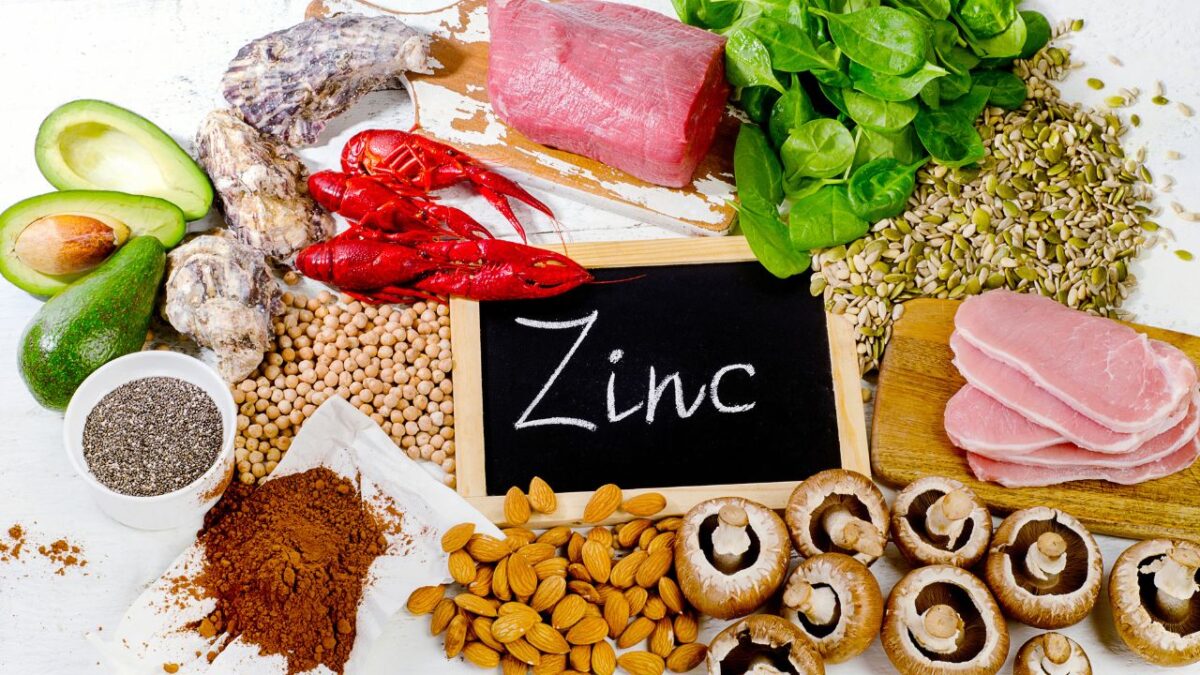Zinc: The Essential Nutrient for a More Comfortable Menopause

When it comes to nutrients that support our health, zinc doesn’t always get the spotlight—but it should! This mighty mineral plays a crucial role in keeping our bodies running smoothly, especially as we age. For women navigating the twists and turns of perimenopause or menopause, zinc might just be the hero you didn’t know you needed. Let’s dive into why zinc deserves a front row seat in your health routine.
What is Zinc?
Zinc is an essential trace mineral, meaning our bodies need it in small amounts, but its impact is anything but small. From supporting your immune system to keeping your skin glowing, zinc is involved in numerous bodily functions. It’s a multitasker—working behind the scenes to help with everything from wound healing to hormone regulation.
Why is Zinc Important?
As we age, our bodies go through various changes, and zinc becomes even more vital. Here’s a quick look at what zinc does:
- Immune System Support: Zinc is like the bodyguard for your immune system, helping to fend off invaders and keep you healthy. As immune function naturally declines with age, getting enough zinc can help keep your defenses strong.
- Skin Health: Worried about wrinkles or dry skin? Zinc plays a key role in collagen synthesis and skin repair, making it a go-to for maintaining healthy, vibrant skin.
- Reproductive Health: Zinc is crucial for hormone balance, which is especially important during perimenopause and menopause when hormones are in flux. It supports everything from menstrual health to libido.
- Cognitive Function: Brain fog, anyone? Zinc supports cognitive function, helping to keep your mind sharp as you age.
- Bone Health: As women age, bone density can decrease, leading to conditions like osteoporosis. Zinc supports bone formation and strength, making it a key player in maintaining strong bones.
- Metabolism: Zinc is involved in over 300 enzymatic reactions in the body, including those that regulate metabolism. Keeping your zinc levels up can help manage weight and energy levels.
Signs of Zinc Deficiency
Unfortunately, many people don’t get enough zinc, especially as they age. Here are some signs that you might be running low on this crucial mineral:
- Common Symptoms: Loss of appetite, hair loss, delayed wound healing, and frequent infections.
- Less Common Symptoms: Diarrhea, impaired taste or smell, and even mood swings.
If any of these symptoms sound familiar, it might be time to check your zinc levels.
Zinc-Rich Foods
Luckily, zinc is found in a variety of delicious foods! Here’s a list of zinc-rich foods to help you keep your levels up:
- Oysters: The ultimate zinc powerhouse.
- Meat: Beef, pork, and chicken are excellent sources.
- Legumes: Lentils, chickpeas, and beans are great plant-based options.
- Whole Grains: Quinoa, brown rice, and oats provide a decent zinc boost.
- Nuts and Seeds: Pumpkin seeds, cashews, and almonds are snackable sources of zinc.
Tips for Incorporating Zinc-Rich Foods into Your Diet
- Add a handful of nuts to your salad or yogurt.
- Swap your usual grain for quinoa at dinner.
- Include a serving of lean meat in your meals.
- Enjoy a seafood night with oysters or shrimp.
Zinc Supplements
Sometimes, even a balanced diet might not be enough, especially if you’re dealing with specific health issues or dietary restrictions. That’s where supplements come in.
When to Consider Zinc Supplements
If you’re noticing symptoms of deficiency or if you have dietary restrictions (like being vegetarian), a supplement might be necessary. However, it’s always best to talk to a healthcare professional before starting any new supplement.
Types of Zinc Supplements
- Zinc Gluconate: Often found in lozenges, it’s great for immune support.
- Zinc Picolinate: Known for better absorption, making it a popular choice.
- Zinc Oxide: Common in multivitamins and skincare products.
Potential Side Effects and Precautions
Too much of a good thing can be bad—taking too much zinc can lead to nausea, headaches, and even interfere with the absorption of other minerals like copper. Stick to the recommended dose and consult your doctor if you’re unsure.
Zinc and Other Nutrients
Zinc doesn’t work alone; it interacts with other nutrients like copper and iron. High levels of zinc can reduce copper absorption, so it’s essential to maintain a balance. Many supplements are formulated to include copper alongside zinc to prevent imbalances.
Takeaway
Zinc might not always be the star of the show, but it’s undoubtedly a key player in maintaining your health, especially as you navigate the changes of perimenopause and menopause. From boosting your immune system to supporting healthy skin and bones, zinc does it all. So, make sure you’re getting enough—whether through food or supplements—and don’t hesitate to consult with a healthcare professional for personalized advice. Your body will thank you!
